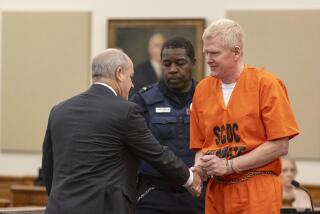Divorce Spurred Susan McDougal to Borrow, Lawyer Says
- Share via
LITTLE ROCK, Ark. — The attorney for Susan McDougal, telling her story publicly for the first time, said Tuesday that the breakup of her marriage in the mid-1980s prompted her to take out a $300,000 loan that now has become the focus of allegations that President Clinton benefited improperly from a joint investment with McDougal and her ex-husband.
Attorney Bobby McDaniel, in an opening statement to the jury in a Whitewater-related trial, said that McDougal borrowed the money because she wanted to invest in a real estate development that would help her “survive economically” without her husband, who at the time was suffering from severe manic-depression.
It was this loan that the government’s central witness, David Hale, contends he made to McDougal under pressure from Clinton. It is one of a number of allegedly improper transactions for which she is on trial, along with her former husband, James B. McDougal, and Arkansas Gov. Jim Guy Tucker.
Some of the money Mrs. McDougal borrowed later passed through the accounts of the Whitewater Land Development Co., which was owned jointly by the McDougals and then-Gov. Clinton and his wife, Hillary Rodham Clinton. As a result, investigators long have suspected, but never proved, that the Clintons benefited from this loan, which was not repaid.
The Clintons have strongly denied that they knew anything about the loan or gained any benefit from it. The president, who has been called to testify later in the trial, also has insisted that he did not ask Hale to loan the money to McDougal, as Hale has alleged.
McDougal, who at 21 married a man 15 years her senior, was portrayed by her attorney as a woman who showed ambition and skill in marketing and advertising the real estate developments funded by Madison Guaranty Savings & Loan, which was owned by her husband.
But she lacked any aptitude for finance, according to her lawyer. To demonstrate her lax attitude toward money, he said, she showed up to receive the $300,000 check from Hale wearing a “little tennis dress,” signed the necessary documents without reading them and then said: “Whee . . . ! This is fun! Can I come back tomorrow?”
Hale, a former municipal judge, loaned the money from his government-backed small-business investment corporation, Capital Management Services Inc. He has said that he was told later by Gov. Clinton that McDougal had squandered the $300,000.
But McDaniel insisted that McDougal was serious about making a success of a development known as Lorrance Heights that she had started with some of the $300,000. He said $25,000 of the loan went toward acquiring the land from International Paper Co. and $105,000 went to construction of roads and drainage.
At one point shortly after it was acquired, the Lorrance Heights property was held by the Whitewater company, in which the McDougals and the Clintons shared an interest. But McDaniel indicated that it was never the intent to share the Lorrance Heights profits with the Clintons.
James McDougal told The Times that he put the property under Whitewater ownership briefly because he thought the Clintons would sign their part of the investment over to him and because he hoped Lorrance Heights then could reap the tax benefits of a $145,000 loss that had been sustained by the Whitewater partnership.
He said that he removed the Lorrance Heights property from its brief Whitewater ownership when the Clintons failed to sign over their part of the partnership. Therefore, he said, the Clintons enjoyed no benefit from the $300,000 loan.
As Susan McDougal’s story unfolded here, Republicans in Washington made another unsuccessful bid to revive Senate Whitewater hearings, which have been looking into many of the same matters at issue in this trial. By a vote of 53 to 47, the GOP majority failed to get the necessary 60 votes needed to end a Democratic filibuster that has prevented the Senate from funding more hearings.
The original authority for the hearings expired Feb. 29.
More to Read
Sign up for Essential California
The most important California stories and recommendations in your inbox every morning.
You may occasionally receive promotional content from the Los Angeles Times.










